Last weekend
I was at FOSSCamp. Since I live in Prague I wanted to go to
Ubuntu Developer Summit (UDS) each day, but unfortunately I had some exams, so I only went on Wednesday and Friday.
On Wednesday I first met
Lars Wirzenius:
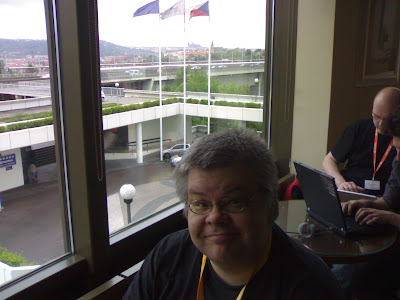
we agreed to go to pub in the evening. Then I did a little work, there was quite a nice view from the window (
Prague castle on the horizon):

and I went to the #ubuntu-devel-summit IRC channel and pinged
Scott Kitterman, whom I new from the
Debian Python Modules Team (DPMT), but didn't know how he looks like. We met and once I knew Scott, it was easy to get around, so he introduced me to
Steve Langasek (pronounced Lang ek). We agreed to go to pub as well. Steve lives in Portland, OR, where I spent the summer 2005 and Scott is from Baltimore where I spent the summer 2006.
Then I also met Riku Voipio,
Martin B hm,
Christian Reis (whom I asked if it's possible to support Debian unstable on
Ubuntu Personal Package Archives and he said that it will probably happen, so that's really cool -- I also offered my help with this) and others, so in the end, there were 14 of us going to the pub, so I chose again the same pub as with the FOSSCamp people and it seems it tasted good again:
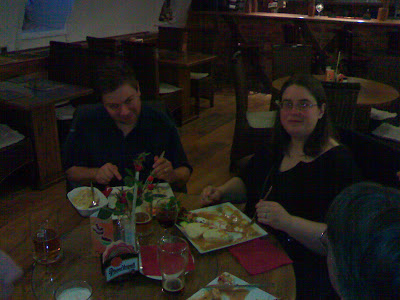
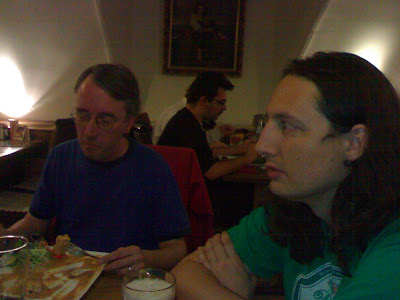
Notice the
sv kov na smetan above, my favourite meal. Good choice Scott. :)
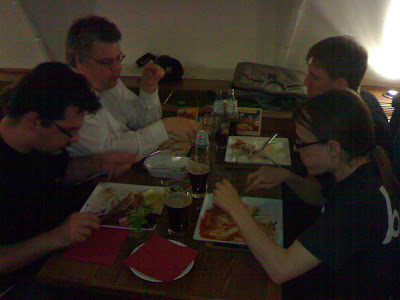
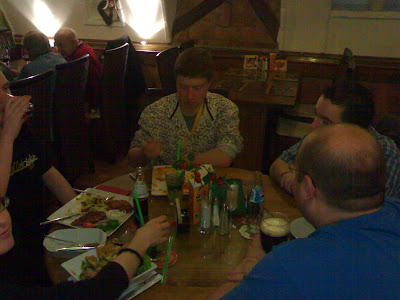
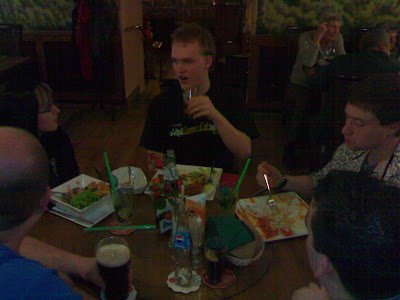
Ok, that was on Wednesday. On Friday I arrived at around 3pm, looked at the schedule table and noticed that
Matthias Klose should be at UDS too, so I started IRC and pinged him. Fortunately,
Emilio Pozuelo Monfort, whom I know from DPMT as well, replied first so we met, it was cool and he showed where Matthias is. I am very glad I met him, so we discussed python-central and python-support packages and why we have them both, also with Scott later on.
When I was waiting for Matthias, I sat next to
Nicolas Valc rcel, started my laptop and begun looking at some
SymPy bugs and Nicolas noticed that and said -- "You are developing SymPy?", I said "Yes.", flattered. And he showed me a bug with plotting and Compiz, so we immediately
reported that to pyglet.
In the evening people continued to some kind of a party, but unfortunately, I was already going to some other pub.
Overall, even though I was there for only two afternoons, it was just awesome and I utterly enjoyed meeting all the people I knew from mailinglists and IRC.
 Buch of quickies:
Buch of quickies:






 Riku Voipio just sent a "bits from armel porters" in debian-devel-announce (sorry, no link: I'm offline while writing this).
I just want to point out that the success of armel becoming an official architecture is also due to the very clever and efficient way the porters interacted with maintainers.
As a very small example, Riku
Riku Voipio just sent a "bits from armel porters" in debian-devel-announce (sorry, no link: I'm offline while writing this).
I just want to point out that the success of armel becoming an official architecture is also due to the very clever and efficient way the porters interacted with maintainers.
As a very small example, Riku 


